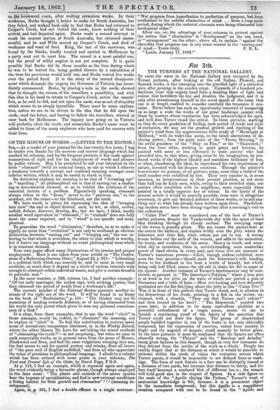ON THE MISUSE OF WORDS :—(LETTER TO THE EDITOR.)
Sut,—As a reader of your journal for the last twenty-five years, I beg to tender you thanks for the nervous and correct language which has marked its columns, and for the frequent protests it has made against mannerisms of style and the lax employment of words and phrases by public writers. May I be permitted to call your attention to the term "eliminate" (with its nominal form), as one in which I observe a tendency towards a corrupt and confused meaning amongst some inferior writers, which it may be useful to cheek in time.
Its derivation explains its meaning to be that of "thrusting out" or "expelling ;" its philosophical use is that of casting out a confus- ing or non-essential element, so as to exhibit the relations of the essential factors of a problem. Figuratively speaking, eliminate always refers to the "dross," never to the "precious ore," to the accident, not the cause—to the falsehood, not the troth.
We have words in plenty for expressing the idea of "bringing into view" the end or object desired, such, to wit, as elicit, evolve, unfold, deduce, discover, develop, &c., but we have, I think, hardly another word equivalent to "eliminate," to "exclude" does not fully meet the sense required, and to "weed" is too specific and meta- phorical.
To generalize the word "elimination," therefore, so as to make it signify no more than "evolution" is not only to confound an obvious distinction between "casting out" and "bringing out," the one re- ferring to that which is worthless, the other to that which is worthy, but it leaves our language without an exact philosophical term which is in constant demand.
Your own pages afford many illustrations of its precise and proper employment. Here is one taken from your article on "The Confes- sions of a Reforming German Duke," August 24, p. 915 : "Liberalism is a political faith which can scarcely be said to exist in very small societies, so much does it depend on a circle of various interests wide enough to eliminate selfish individual wants, and give a certain breadth to patriotic zeal." In the same number, p. 929, column 1st, I find another example : "Of too early marriages, the author says, with striking justice, that they eliminate the period of youth from a workman's life."
The current number of the National Review presents another in- stance of the right use of the word. It will be found in an Essay on the book of "Ecclesiastes," p. 155: "The thinker may not be conscious of tending towards Atheism, or of having eliminated from his world the only power which gives to man any personal conscious- ness of a God."
It is clear, from these examples, that to use the word "elicit" in these passages, would be, indeed, to "eliminate" the meaning, not to express or "elicit" it. To find this substitution in curious speci- mens of second-rate temperance literature, as in the Weekly Record, where the editor blames -Dr. Lees for not taking the wisest methods of "eliminating the truth !"—is not surprising; but when we pass to such respectable works, as in general issue from the press of Messrs. Blackwood and Sons, and find the same vulgarisms creeping into use, the fact seems to call for special protest and rebuke, from all lovers of "the pure well of English undefiled," and from all who appreciate the value of precision in philosophical language. I allude to a volume which has been noticed with some praise in your columns, The Past and Present Life of the Globe, by David Page, F.G.S.
At p. 118, I find an example, which is repeated again and again, the word evidently being a favourite phrase, though always employed in the false sense : "The plants and animals of the newer epochs bear the impress of specialization, and find in new external conditions a fitting habitat for their growth and elimination" I ! I (meaning de- velopment).
Again, at p. 221, I find a double offence in a single sentence :
mechanism to the subtler elms:lotion of mind. . . from a long azoic period, during which the material elements were being eliminated into mechanical order."
Allow me, sir, the advantage of your columns to protest against the notion that "elimination" is "development" on the one hand, or "arrangement" on the other; above all, to reclaim "against the absurdity that progress can in any sense consist in the casting-out'






























 Previous page
Previous page